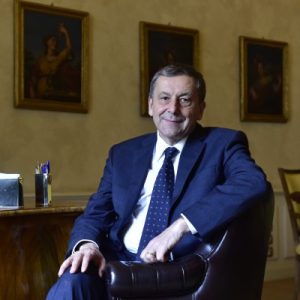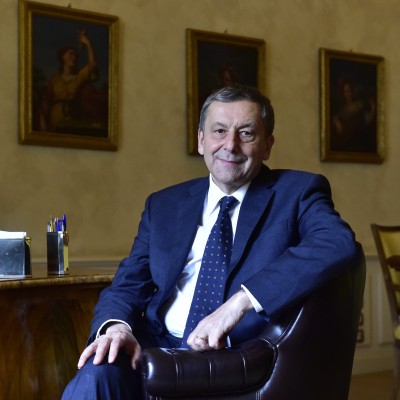La Stampa: Francesco Profumo – “The ministry only supervises individual acts. Autonomy is not up for discussion”


Source: La Stampa, also in physical edition from June 09th 2024, page 24.
Francesco Profumo: “The ministry only supervises individual acts. Autonomy is not in question”
The former president of Compagnia and Acri: “The system of institutions has antibodies. For appointments, the triad mechanism doesn’t work, a simple indication is better”
By Claudia Luise, June 9th, 2024 at 12:17
4 min reading
“Foundations have the antibodies to overcome complicated moments”. Francesco Profumo, former President of the Compagnia di San Paolo and former President of Acri (l’Associazione di Fondazioni e di Casse di Risparmio italiane) answers the phone while he is at the airport, engaged in his double life as a trainer with the academic institution OPIT (of which he is rector) and an innovator with Isybank, the online bank of Intesa Sanpaolo (of which he is President).
What is your opinion on the Crt Foundation affair?
“I don’t want to go into the Crt issue, because I don’t know the details and it’s not my responsibility, but I can report my personal experience, as a former president of the foundation. In recent months, the Compagnia di San Paolo has undertaken the process of revising its statute and renewing its governance, everything went smoothly and within the expected time frame. I believe that the Society’s statute is a good statute and that it can also be a model for other foundations. As preliminaries to the revision of the statute, which is approximately 10 years old, the new post-pandemic national and European context, the hybrid territorial foundation model and the new operating methods tested in the last 8 years, during my presidency, were posed. The designating bodies have a very important role, because they designate the Councilors of the new governance, with the skills necessary to make the foundation work well collegially. The designations are “dry”, one for each position to be renewed. The Steering Committee constitutes a collegial evaluation of the CV of each designee and votes on their appointment. The Directors thus appointed have no mandate and must work for the good of the foundation and the beneficiaries”.
If a commissioner arrives in Turin, could the “fool” made by the territory also generate repercussions within the Company?
“I do not think so. The Company has demonstrated over the decades that it is a resilient entity, despite natural transitions in governance. Some accidents can happen in a large community like that of foundations, in Italy there are 86, but I believe that there are the right antibodies to bring these events back to the right dimension”.
Is it right for foundations to be controlled at a public level?
“The ruling of the Consulta, 300 of 2003, clarified that foundations are private bodies with full statutory and management autonomy, non-profit, with social objectives, subject to legitimacy supervision of individual acts by the Treasury. So there are all the elements for these bodies to be responsibly autonomous. From this point of view there has been an interesting evolution.”
What was it?
“The thirty years of the foundations can be divided into approximately three decades. The first, from the Amato law (1990) to the Ciampi law (1999), in which well-defined rules did not yet exist and potential beneficiaries asked for resources directly from the foundations, which responded based on availability. The second, from the Ciampi law to the signing of the Acri-MEF protocol (2015), in which the rules were written, for example on the management of assets and on the maximum number of director mandates”.
And now?
“The maturity of the foundations has been underway since 2015. Today they are subjects who act, in the territories, as development agents and, as such, have developed the strategic capacity to define objectives, priorities and methods of intervention and operate in subsidiarity with other third sector subjects, public and private. Many foundations today operate in a hybrid mode: they are not only providers, but also implementers.”
What does this mutation mean?
“Foundations increasingly often implement capacity building, co-planning and results evaluation actions. The Pnrr was a very interesting field of experimentation with excellent results.”
What do you think of Lagarde’s decision to lower rates?
“The European Central Bank acted correctly.”
What path should the ECB take?
“President Lagarde’s words are very clear. “Interest rates must remain restrictive as long as necessary to ensure price stability on a lasting basis“. In other words, we will still have to keep our foot on the brake pedal for a while, even if we don’t push as hard as before.”
OPIT, the leading academic institution dedicated to the digital themes, is organizing a meeting at the Grattacielo Intesa Sanpaolo in Turin on Thursday. But why do we need educational programs like this?
“Next will be the second academic year of this new institution which is based in Malta. The fundamental reason is that there is a demand for education that is closely connected to the digital transition, with all that it entails, both from the point of view of skills and the speed of change and uncertainty. Industrial revolutions previously lasted up to 90 years and therefore what you learned in school was enough for a lifetime. This industrial revolution, however, will be very short, it will last about twenty years, so it will be necessary to do more training. And then, while in the other three revolutions there was a partial replacement of people’s muscular strength with a form of energy, now for the first time we have an aid to brain activity.”
What impact does all this have on education?
“By putting these elements together, we understand that the training models and the resulting offer will have to be different compared to the past: they will have to be more diversified (different actors who will play their part in this new world that is being built) and based on a model of people’s lives that surpasses the current one, dictated by a part of studying/training, a part of work and a part of retirement. The reduction of the times of this revolution will ensure that what we have learned in school is not enough and therefore we will need to go back to school several times, unlearning things we have learned and learning new ones. In the first part of life, therefore, we must learn to learn; otherwise, updating skills will become extremely tiring for people. So there is a growing demand to decouple knowledge from skills: the former will last a lifetime, the latter will not. OPIT is an educational offer designed not on the basis of previous experiences, but on the basis of future needs. There are teachers from over 40 countries and the accreditation is done in an English-speaking nation to have a truly international spirit with students from all over the world who can contribute to the creation of this new training culture.”
What role could the Italian foundation for AI, born in Turin a few weeks ago, have?
“It is a little early to say what the operational model of the Foundation will be, the President has just been appointed and the first act will be the start of the selection procedure for the Director. The Director, who is the central figure for the development of the Centre, will have to present the Strategic Plan, which will indicate the main sectors of activity, the skills of the staff who will have to be hired initially and the network of scientific relations at local, Italian and European level , which will be launched in the first two years of the Foundation’s life. The times will not be short, also due to the competition with other similar initiatives, which are developing in Italy and Europe”.
As president of Isybank, how do you combine all the roles?
“Training, research and applications in the artificial intelligence sector are and will be increasingly interesting, with their developments happening in the coming years. We are only at the dawn of a revolution that will profoundly change our way of living, studying and working and we will have to be prepared to manage these transitions. I am sure that the speed of change and the uncertainty of the future will be two characterizing elements of this historical phase and we will have to be very careful not to forget the centrality of man and the ethical aspects with respect to the changes we will have to make. We will have to be very attentive to the education of the new generations, starting from the first years of school, but we will also have to invest with great attention in people already in adulthood, who will have to be accompanied and not abandoned. With reference to Isybank, I have started studying and I hope that in a reasonable time I will be able to make an intellectual and operational contribution to a sector of great importance for our country”.
Have questions?
Visit our FAQ page or get in touch with us!
Write us at +39 335 576 0263
Get in touch at hello@opit.com
Talk to one of our Study Advisors
We are international
We can speak in:




